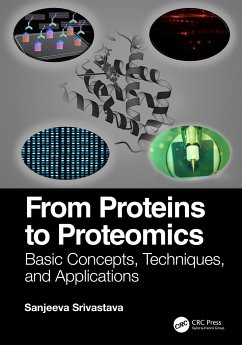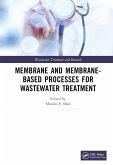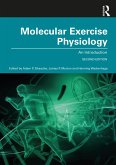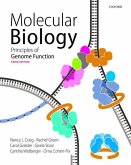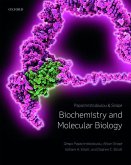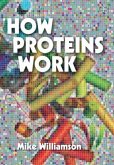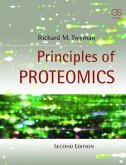- Broschiertes Buch
- Merkliste
- Auf die Merkliste
- Bewerten Bewerten
- Teilen
- Produkt teilen
- Produkterinnerung
- Produkterinnerung
This book provides a detailed understanding of the basics of proteins and proteomics, Gel based-proteomics techniques, basics of mass-spectrometry and quantitative proteomics, Interactomics: basics and applications, and advancement in proteomics.
Andere Kunden interessierten sich auch für
![Membrane and Membrane-Based Processes for Wastewater Treatment Membrane and Membrane-Based Processes for Wastewater Treatment]() Membrane and Membrane-Based Processes for Wastewater Treatment133,99 €
Membrane and Membrane-Based Processes for Wastewater Treatment133,99 €![Molecular Exercise Physiology Molecular Exercise Physiology]() Molecular Exercise Physiology68,99 €
Molecular Exercise Physiology68,99 €![Molecular Biology Molecular Biology]() Nancy Craig (Department of Molecular Biology Professor and GeneticMolecular Biology58,99 €
Nancy Craig (Department of Molecular Biology Professor and GeneticMolecular Biology58,99 €![Biochemistry and Molecular Biology Biochemistry and Molecular Biology]() Alison Snape (Reader in Biochemistry and King's Medical EducationBiochemistry and Molecular Biology51,99 €
Alison Snape (Reader in Biochemistry and King's Medical EducationBiochemistry and Molecular Biology51,99 €![How Proteins Work How Proteins Work]() Michael WilliamsonHow Proteins Work93,99 €
Michael WilliamsonHow Proteins Work93,99 €![Principles of Proteomics Principles of Proteomics]() Richard TwymanPrinciples of Proteomics93,99 €
Richard TwymanPrinciples of Proteomics93,99 €![The Role of Business in Global Sustainability Transformations The Role of Business in Global Sustainability Transformations]() The Role of Business in Global Sustainability Transformations44,99 €
The Role of Business in Global Sustainability Transformations44,99 €-
-
-
This book provides a detailed understanding of the basics of proteins and proteomics, Gel based-proteomics techniques, basics of mass-spectrometry and quantitative proteomics, Interactomics: basics and applications, and advancement in proteomics.
Produktdetails
- Produktdetails
- Verlag: Taylor & Francis Ltd
- Seitenzahl: 262
- Erscheinungstermin: 29. Dezember 2022
- Englisch
- Abmessung: 175mm x 253mm x 16mm
- Gewicht: 550g
- ISBN-13: 9780367566203
- ISBN-10: 0367566206
- Artikelnr.: 64105016
- Verlag: Taylor & Francis Ltd
- Seitenzahl: 262
- Erscheinungstermin: 29. Dezember 2022
- Englisch
- Abmessung: 175mm x 253mm x 16mm
- Gewicht: 550g
- ISBN-13: 9780367566203
- ISBN-10: 0367566206
- Artikelnr.: 64105016
Prof. Sanjeeva Srivastava is a professor and the group leader of the Proteomics Laboratory at the Department of Biosciences and Bioengineering at the Indian Institute of Technology, Bombay. High-throughput proteomics, protein microarrays, and mass spectrometry are among his specialties. He has implemented ground-breaking AI-driven data analytics on big biological datasets. He has been at the forefront of biomedical research based on big data. His group's current research focuses on the development of clinical biomarkers for infectious diseases and malignancies. His group also pioneered therapeutic target identification efforts and decoded protein interaction networks in human illnesses like gliomas and contagious diseases like COVID-19 and malaria. His group has developed reliable diagnostic biomarkers and described the pathophysiology of severe malaria (falciparum and vivax) and COVID-19, especially the underlying mechanisms that lead to the development of severe sequelae. Dr. Srivastava is an active contributor to global proteomics research and development. He serves on the Executive Committee of Human Proteome Organization (HUPO) and Proteomics Society, India (PSI). He has more than 125 publications from his work as an independent researcher at IIT Bombay. To date, he has filed 15 patents that include biomarkers for various types of cancers, infectious diseases like malaria, leptospirosis, COVID-19, and method improvement in uncharted territories such as fish and plant proteomics.
Module 1: Basics of proteins and proteomics
Basics of amino acids and proteins
Protein chemistry to proteomics
Module 2: Gel-based proteomics techniques
Gel-based proteomics
2-d difference in gel electrophoresis (2d-dige)
Gel-based proteomic data analysis
Module 3: Basics of mass-spectrometry and quantitative proteomics
Introduction to mass spectrometry
Hybrid mass spectrometry configurations
Tandem mass spectrometry for protein identification
In vitro quantitative proteomics using itraq
In vivo quantitative proteomics using silac
Module 4: Interactomics: basics and application
Introduction to interactomics
Antigen and antibody microarrays
Cell-free expression based protein microarrays
Nucleic acid programmable protein arrays
Label-free proteomics
Surface plasmon resonance
Surface plasmon resonance imaging
Protein interaction analysis using spr and spri
Module 5: Advancement in proteomics
Proteomics for translational research
Future of proteomics for clinical applications
Challenges in clinical proteomics
Basics of amino acids and proteins
Protein chemistry to proteomics
Module 2: Gel-based proteomics techniques
Gel-based proteomics
2-d difference in gel electrophoresis (2d-dige)
Gel-based proteomic data analysis
Module 3: Basics of mass-spectrometry and quantitative proteomics
Introduction to mass spectrometry
Hybrid mass spectrometry configurations
Tandem mass spectrometry for protein identification
In vitro quantitative proteomics using itraq
In vivo quantitative proteomics using silac
Module 4: Interactomics: basics and application
Introduction to interactomics
Antigen and antibody microarrays
Cell-free expression based protein microarrays
Nucleic acid programmable protein arrays
Label-free proteomics
Surface plasmon resonance
Surface plasmon resonance imaging
Protein interaction analysis using spr and spri
Module 5: Advancement in proteomics
Proteomics for translational research
Future of proteomics for clinical applications
Challenges in clinical proteomics
Module 1: Basics of proteins and proteomics
Basics of amino acids and proteins
Protein chemistry to proteomics
Module 2: Gel-based proteomics techniques
Gel-based proteomics
2-d difference in gel electrophoresis (2d-dige)
Gel-based proteomic data analysis
Module 3: Basics of mass-spectrometry and quantitative proteomics
Introduction to mass spectrometry
Hybrid mass spectrometry configurations
Tandem mass spectrometry for protein identification
In vitro quantitative proteomics using itraq
In vivo quantitative proteomics using silac
Module 4: Interactomics: basics and application
Introduction to interactomics
Antigen and antibody microarrays
Cell-free expression based protein microarrays
Nucleic acid programmable protein arrays
Label-free proteomics
Surface plasmon resonance
Surface plasmon resonance imaging
Protein interaction analysis using spr and spri
Module 5: Advancement in proteomics
Proteomics for translational research
Future of proteomics for clinical applications
Challenges in clinical proteomics
Basics of amino acids and proteins
Protein chemistry to proteomics
Module 2: Gel-based proteomics techniques
Gel-based proteomics
2-d difference in gel electrophoresis (2d-dige)
Gel-based proteomic data analysis
Module 3: Basics of mass-spectrometry and quantitative proteomics
Introduction to mass spectrometry
Hybrid mass spectrometry configurations
Tandem mass spectrometry for protein identification
In vitro quantitative proteomics using itraq
In vivo quantitative proteomics using silac
Module 4: Interactomics: basics and application
Introduction to interactomics
Antigen and antibody microarrays
Cell-free expression based protein microarrays
Nucleic acid programmable protein arrays
Label-free proteomics
Surface plasmon resonance
Surface plasmon resonance imaging
Protein interaction analysis using spr and spri
Module 5: Advancement in proteomics
Proteomics for translational research
Future of proteomics for clinical applications
Challenges in clinical proteomics

